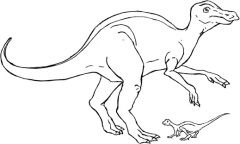Grade Level(s):
- 6-8
Source:
- UC Museum of Paleontology
Resource type:
- Classroom activity
Time: Two class periods.
Overview
Students are presented with a set of data about dinosaurs and are asked to make hypotheses about what the data can tell us.

- [Evidence of evolution: Grades 6-8] Fossils provide evidence of past life. (LS4.A)
- [Nature of science: Grades 6-8] Science focuses on natural phenomena and processes. (NOS8)
- [Nature of science: Grades 6-8] Scientific knowledge is open to question and revision as we come up with new ideas and discover new evidence. (P6, NOS3)
- [Nature of science: Grades 6-8] A hallmark of science is exposing ideas to testing. (P3, P4, P6, P7)
- [Nature of science: Grades 6-8] Scientists test their ideas using multiple lines of evidence.
- [Nature of science: Grades 6-8] Scientists use multiple research methods (experiments, observations, comparisons, and modeling) to collect evidence. (P2, P3, P4, NOS1)
- [Nature of science: Grades 6-8] Scientists can test ideas about events and processes long past, very distant, and not directly observable.
- [Nature of science: Grades 6-8] The real process of science is complex, iterative, and can take many different paths.
- [Nature of science: Grades 6-8] Science is a human endeavor. (NOS7)
- [Studying evolution: Grades 6-8] Our knowledge of the evolution of living things is always being refined as we gather more evidence.
- [Studying evolution: Grades 6-8] Scientists use multiple lines of evidence to study life over time.
- [Studying evolution: Grades 6-8] Scientists use geological evidence to establish the age of fossils.
- Disciplinary Core Idea LS4.A: Evidence of Common Ancestry and Diversity
- Disciplinary Core Idea ESS1.C: The History of Planet Earth
- NOS Matrix understanding category 1. Scientific investigations use a variety of methods.
- NOS Matrix understanding category 3. Scientific knowledge is open to revision in light of new evidence.
- NOS Matrix understanding category 7. Science is a human endeavor.
- NOS Matrix understanding category 8. Science addresses questions about the natural and material world.
- Science and Engineering Practice 2. Developing and using models
- Science and Engineering Practice 4. Analyzing and interpreting data
- Science and Engineering Practice 6. Constructing explanations and designing solutions
- Science and Engineering Practice 7. Engaging in argument from evidence
There are currently no teaching tips for this resource.
